

ALEMÁN. ALEMÁN. Learn German online easily for free! Welcome to our ü audio training.
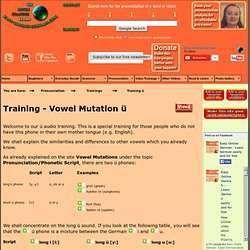
This is a special training for those people who do not have this phone in their own mother tongue (e.g. English). We shall explain the similarities and differences to other vowels which you already know. As already explained on the site Vowel Mutations under the topic Pronunciation/Phonetic Script, there are two ü phones: We shall concentrate on the long ü sound. Roundedness. Learn German online - Free German lessons - Speak German. Rajendra Paul (06-01-2014): Such a good experience to learn with your help German languages with some nice note's thank to you to provide us free learning course. pradeepa (07-11-2013): its one of the best tool to learn basics of all essential language. thank you...........

Tanhya Frain (06-07-2013): This is so simple. Fantastic. Grimm Grammar : cases overview : Fälle. Cases:Fälle What is a case, you may ask.
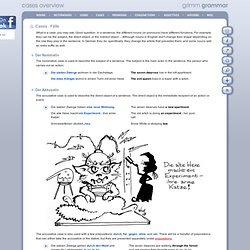
Good question. The free dictionary for foreign languages, German spelling and full-text translations. Case. German Grammar, Online Dictionary for Spelling, Inflection and Wordformation of the German Language. Teaching Materials. Teaching Materials. Grimm Grammar : dative : Der Dativ. Cases:Der Dativ The dative case is used to describe the indirect object of a sentence.
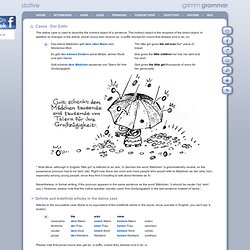
The indirect object is the recipient of the direct object. In addition to changes in the article, plural nouns also receive an -n suffix (except for nouns that already end in an -n). * Nota Bene: although in English 'little girl' is referred to as 'she,' in German the word 'Mädchen' is grammatically neutral, so the possessive pronoun has to be 'sein' (its). Right now, there are more and more people who would refer to Mädchen as 'sie' (she, her), especially among young people, since they find it insulting to talk about females as 'it.' Nevertheless, in formal writing, if the pronoun appears in the same sentence as the word 'Mädchen,' it should be neuter ('es' 'sein', usu.). Definite and Indefinite articles in the dative case. Handout: Kasus: Nominativ und Akkusativ. The subject of a sentence is the person or thing that is “doing” the verb.
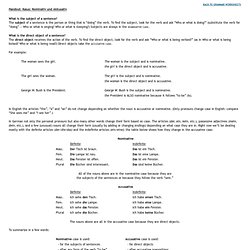
Nebensatz: Form: Eingeleiteter Nebensatz. Grimm Grammar : flavoring particles : Modalpartikeln. Miscellaneous:Modalpartikeln Modal particles are an uninflected part of speech that emphasize a particular aspect of a message and convey the speaker's mood or attitude towards this message.
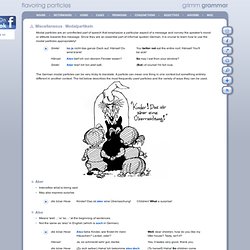
Since they are an essential part of informal spoken German, it is crucial to learn how to use the modal particles appropriately! The German modal particles can be very tricky to translate. A particle can mean one thing in one context but something entirely different in another context. The list below describes the most frequently used particles and the variety of ways they can be used. Aber Intensifies what is being said May also express surprise Also. Dativ-Ergänzung. The German Consonant 'r' - Paul Joyce. Deutsch. Deutsch.com - Deutsch für Jugendliche.
Reading material. Grammar. Forvo: the pronunciation guide. All the words in the world pronounced by native speakers. Wir können alles pronunciation: How to pronounce Wir können alles in German. WWW leo.org. Nebensatz: Form: Eingeleiteter Nebensatz. Free Language-Learning Resources Online. The Blog for all who want to learn German… May 2013 suck in comparison to 2014 :) Helping German learners learn German. Levi Antrim. Newest Questions - German Language Stack Exchange. Newest Questions - German Language Stack Exchange. Would you like. Quick Tip from a German Student. I recently learned conjunctions and wanted to share quick tips that are really helpful and easy.

There are only 5 coordinating conjunctions, called "ADOSU or USODA," it is an acronym for the following: A - aber (but) D - denn (because [coordinating]) O - oder (or) S - sondern (but rather) U - und (and) any other conjunction is automatically subordinating. well why does this matter? Subordinating conjunctions are little monsters.
They pick the verb up and throw them as far away as possible (to the end of the clause). Ich liebe Deutsch, denn meine Lehrerin ist nett. Note the sentence structure didn't change, there is a comma in place, and denn is considered a coordinating because it is a "ADOSU/USODA. " Ich muss Deutsch lernen, und ich spreche Englisch. --> Ich muss Deutsch lernen und spreche Englisch. The comma is very important. Der Hund schlaeft am besten, solange er nicht isst. Audio: Ger. for Beg. - Lesson 9-2. Boomerang TV Events. Mauswelt - Die Seite mit der Maus. Sag einfach ja" by Tim Bendzko from German to English. Rammstein Wo bist du? lyric with English translation. “Wo bist du?”

(Where are you?) Is a song that was supposed to be on Reise, Reise but because Rammstein wanted to make Reise, Reise the hardest album they have made so far, it was felt that the song was too gentle and it was left out. The song begins with a clarinet and then the rest of the instruments begin to play. The song is different because the keyboard is the instrument that is easiest to hear.
Rammstein Wo bist du? Tags: Alle Uhren, Rammstein Wo Copyright 2004-2014 Affenknecht.com, Rammstein trademark and other trademarks are property of their respective owners.